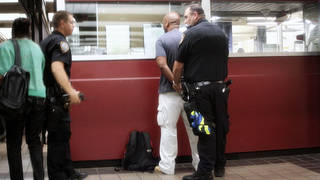
Topics
Guests
- Joyce WilliamsBronx great-grandmother victimized in a stop-and-frisk incident.
- Thenjiwe McHarrisNew York organizer and activist.
At the march opposing the NYPD’s stop-and-frisk policy in New York City, Joyce Williams, a Bronx great-grandmother, victimized in a stop-and-frisk incident, says she had money taken from her when he was stopped by police last year: “If they’re stealing from great-grandmothers, they’re stealing from these young kids, also,” Williams says. We also speak with organizer and activist Thenjiwe McHarris. “Young people of color … cannot walk down the street without being profiled,” McHarris says. “It’s not just [police] stopping them, asking them questions, but they’re stopping them and they’re communicating a very powerful message to them, which is: 'You are black. You are brown. You are a person of color. You are in a city where you live. And there is something really wrong with you.' And that hurts.” [includes rush transcript]
Transcript
AMY GOODMAN: There were all generations in Sunday’s march. I spoke to a young activist and a great-grandmother.
JOYCE WILLIAMS: Joyce Williams, and I’m in solidarity with all the young people that are constantly stopped and frisked. I see it constantly in my community. Unfortunately, I’m also a victim of being stopped and frisked by New York City’s police. About six or eight months ago, I was stopped, manhandled, physically manhandled, womanhandled, with the police woman digging in my bra.
AMY GOODMAN: You’re a great-grandmother?
JOYCE WILLIAMS: I’m a great-grandmother. I have great-grandchildren, yes.
AMY GOODMAN: Did they arrest you?
JOYCE WILLIAMS: No, they didn’t. They didn’t. What I’m trying to do is find out was there a report. So I wrote to the governor. I’m smart enough to know that you don’t go into a precinct to tell policemen about their friends that stop and frisk you. You don’t do that. I’m not that stupid. So, and I know Bloomberg isn’t going to do anything against the police. So I wrote to Governor Cuomo. Let the ex-attorney general, whatever his name—whatever his title was, let him let it work its way down. That’s the tactic I took.
AMY GOODMAN: Why did the police say they stopped you?
JOYCE WILLIAMS: Because they could.
AMY GOODMAN: Were you in this area? We’re on the Upper East Side.
JOYCE WILLIAMS: No, no, no. I was in the Bronx where I live. I had just left my apartment, going to pay bills with bill money in my pocket. When the police walked away from me, my bill money was gone. That’s what I’m upset about, because if they’re stealing from great-grandmothers, they’re stealing from these young kids, also.
THENJIWE McHARRIS: My name is Thenjiwe. Why I’m out here today is I’ve been organizing in New York City for years, whether it’s Amadou Diallo, Sean Bell’s case, organizing around Trayvon Martin, Troy Davis, but also organizing around the fact that young people of color, young black and brown men and women in this city and in cities throughout this country, cannot walk down the street without being profiled, cannot go from point A to point B without someone, particularly a police officer or security force, identifying them with criminal activity. And I’m here today because it’s not just them stopping them, asking them questions, but they’re stopping them and they’re communicating a very powerful message to them, which is: “You are black. You are brown. You are a person of color. You are in a city where you live. And there’s something really wrong with you.” And that hurts.
AMY GOODMAN: Voices of Sunday’s Stop Stop-and-Frisk silent march.












Media Options